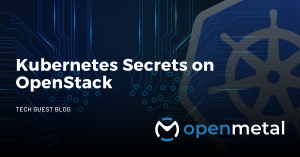Wherever you search for OpenStack and Kubernetes, chances are you’ll run across something around Telecommunications (telco). Although OpenStack is used across many organizations, including Mercedes Benz, telco is typically the heaviest industry when it comes to OpenStack.
In this blog post, you’ll learn about Kubernetes on OpenStack for telco, which will most likely open your eyes to why you’d want to use Kubernetes on OpenStack for any industry.
Kubernetes at Scale
Mercedes Benz, a popular German car manufacturer, has over 900 Kubernetes clusters on OpenStack. Yes, you read that right and it wasn’t a typo – NINE HUNDRED Kubernetes clusters. Combining the power of OpenStack, Cluster API, and automation tools, Kubernetes scales amazingly well. Whether you’re running multi-tenant clusters, single-tenant clusters, or hundreds of clusters that are a combination of single and multi-tenant, OpenStack can help you scale much faster than a standard raw Kubernetes cluster running on Virtual Machines.
OpenStack provides many ways to create and manage Kubernetes clusters, including Magnum and Loki. You can also use popular tools like Kubeadm to spin up Kubernetes clusters. When it comes to security groups, volumes/CSIs, virtual machine sizes, and network frameworks/CNIs, the most popular platforms work with Kubernetes running on OpenStack.
Networking Speed
When it comes to Telco, one of the most obvious concerns is network speed. How many of us have called our Internet Service Provider or cell phone provider to complain about speed or spotty service? With speed in mind, Telco providers can’t worry about if their network bandwidth is going to get bogged down by a public cloud, especially when applications are running on Kubernetes. If you’re running a service mesh, multiple services, and ingress, the last thing you want to worry about is network latency (especially since you may already see some with things like a service mesh).
Instead, you want full control of bandwidth, both inbound and outbound, Quality of Service (QoS), and throttling based on certain needs and end-user internet/cell phone plans.
Running Kubernetes on OpenStack gives you the ability to manage network throughput from one, centralized location across your entire Kubernetes environment.
Security
The truth is, when you’re running services in a public cloud, there are so many compliance regulations set that overall infrastructure security isn’t really something that most are worried about anymore. However, there are a lot of special cases and concerns around not controlling the infrastructure, network, and encryption inside of a traditional data center. For example, Microsoft, back in March 2022, had a data breach by the Lapsus$ Hacker Group.
This information shows that anyone, even an organization like Microsoft, can get hacked. However, many teams and leadership don’t want to take this risk. Instead, they would rather hire security pros internally to help mitigate this risk as much as possible. The other reality is that hacker groups are mostly targeting (when they are targeting, which isn’t always the case) large enterprises. That means many organizations that are using a large enterprise system are sort of just swept by the same wave due to association.
Another aspect from a security perspective is a certain level of compliance. Many organizations, including healthcare and government, must keep certain pieces of infrastructure on-prem due to compliance and regulatory needs. Because of that, utilizing OpenStack helps meet compliance needs and makes things easier as it “feels” like a public cloud, so you get the best of both worlds.
Private Cloud
One of the final pieces to the puzzle is having a private cloud. Many public clouds based their ideas on what runs in OpenStack, which goes to show you that OpenStack is a pretty incredible solution. The great thing about OpenStack is you can have the look, smell, and feel of a public cloud-based on the Horizon OpenStack UI, but you manage all of the infrastructure yourself. Everything from:
- Servers
- Storage
- Network
- CPU
- Memory
and a lot more is all based on what you deem appropriate in your environment. Having the power of combining a virtualized, hybrid solution for OpenStack to get the power of the private cloud and combine it with the Kubernetes API allows organizations to scale how they want to scale and use the hardware that they want to use.
A quick tidbit – When it comes to cost, running Kubernetes on OpenStack via OpenMetal could be $18,468 to $293,701 cheaper than running it on a public cloud.
Watch the Presentation
Hear Michael discuss Kubernetes on OpenStack for Telco in his guest video tutorial below.
About Our Guest Writer
Michael Levan is a consultant, researcher, and content creator with a career that has spanned countless business sectors, and includes working with companies such as Microsoft, IBM, and Pluralsight. An engineer at heart, he is passionate about enabling excellence in software development, SRE, DevOps, and actively mentors developers to help them realize their full potential. You can learn more about Michael on his website at: https://michaellevan.net
Interested in Learning More?
OpenMetal and OpenStack are the perfect fit for Kubernetes. But don’t take our word for it:
- Schedule a meeting with the OpenMetal team to discuss your unique needs or a custom Proof of Concept (PoC)
- Request an OpenMetal On-Demand Private Cloud Trial to experience the performance and benefits for yourself or your organization.
More on the OpenMetal Blog…

Kubernetes Secrets on OpenStack
In this blog post, you’ll learn about what secrets are, how to create standard Kubernetes secrets, and how to get started with the OpenStack Key Manager. For any application that you’re deploying …Read More

It may be surprising to see large scale OpenStack use cases such as Walmart or China Mobile, or use cases in organizations like NASA who have stringent security regulations, but the ability of organizations to fine tune and customize …Read More

Key Considerations When Choosing Infrastructure For Hosting Kubernetes Workloads
In this blog post, we’ll explore the key considerations you should keep in mind when choosing the right infrastructure to host your Kubernetes workloads… Read More
Test Drive
For eligible organizations, individuals, and Open Source Partners, Private Cloud Cores are free to trial. Apply today to qualify.
Subscribe
Join our community! Subscribe to our newsletter to get the latest company news, product releases, updates from partners, and more.




































